How do Antiviral drugs work?
Antiviral drugs work by targeting different stages of the viral life cycle, including cell entry, uncoating, transcription of viral genome, translation, assembly of virion components, and release. Here's how antiviral drugs can interfere with each of these stages:
Cell entry: Some antiviral
drugs can prevent the virus from attaching to the host cell by blocking viral
receptors on the cell surface. For example, the antiviral drug oseltamivir can
block the influenza virus from attaching to respiratory epithelial cells.
Uncoating: After entering
the host cell, viruses must uncoat their genetic material to initiate
replication. Some antiviral drugs can prevent uncoating by stabilizing the
viral capsid or preventing the release of viral genetic material. For example,
amantadine can block the uncoating of influenza virus.
Transcription of viral genome: Once the virus
has uncoated its genetic material, it must be transcribed to produce viral RNA
or DNA. Some antiviral drugs can target viral polymerases or other proteins
involved in transcription, preventing the virus from producing more viral RNA
or DNA. For example, acyclovir can inhibit the viral DNA polymerase of herpes
simplex virus.
Translation: After the
viral genome has been transcribed, it must be translated into viral proteins.
Some antiviral drugs can interfere with viral protein synthesis by blocking
ribosomes or other cellular machinery required for translation. For example,
ribavirin can inhibit the viral RNA polymerase of hepatitis C virus.
Assembly of virion components: Once the viral
proteins have been produced, they must be assembled into new virus particles.
Some antiviral drugs can interfere with viral assembly by blocking viral
proteases or other proteins involved in virion formation. For example, protease
inhibitors can block the processing of viral polyproteins and prevent the
assembly of new virus particles in HIV.
Release: Finally, the
newly assembled virus particles must be released from the host cell to infect
other cells. Some antiviral drugs can prevent viral release by blocking budding
or by inducing host cell death. For example, Tamiflu can block the release of
new influenza virions from infected cells.
It's
worth noting that antiviral drugs can have side effects and can interact with
other medications, so it's important to use them under the guidance of a
healthcare provider. Additionally, not all viral infections can be treated with
antiviral drugs, and the effectiveness of antiviral therapy can vary depending
on the virus and the stage of the infection.




Comments
Post a Comment
Thanks